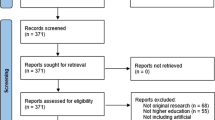Abstract
The focus of this article is university teachers’ and students’ views of plagiarism, plagiarism detection, and the use of plagiarism detection software as learning support. The data were collected from teachers and students who participated in a pilot project to test plagiarism detection software at a major university in Finland. The data were analysed through factor analysis, T-tests and inductive content analysis. Three distinct reasons for plagiarism were identified: intentional, unintentional and contextual. The teachers did not utilise plagiarism detection to support student learning to any great extent. We discuss the pedagogical implications and suggest that the contextual reasons for plagiarism require focus primarily on study strategies, whereas the intentional reasons require profound discussion about attitudes and conceptions of good learning and university-level study habits.
Similar content being viewed by others
References
Abasi, A. R., & Graves, B. (2008). Academic literacy and plagiarism: conversations with international graduate students and disciplinary professors. Journal of English for Academic Purposes, 7, 221–233.
Angélil-Carter, S. (2000). Stolen language? Plagiarism in writing. London: Pearson Education.
Ashworth, P., Freewood, M., & Macdonald, R. (2003). The student lifeworld and the meanings of plagiarism. Journal of Phenomenological Psychology, 34, 257–278.
Breen, L., & Maassen, M. (2005). Reducing the incidence of plagiarism in an undergraduate course: the role of education. Issues in Educational Research, 15(1), 1–16.
Comas-Forgas, R., & Sureda-Negre, J. (2010). Academic plagiarism: explanatory factors from students’ perspective. Journal of Academic Ethics, 8, 217–232.
Eret, E., & Gokmenoglu, T. (2010). Plagiarism in higher education: a case study with prospective academicians. Procedia Social and Behavioral Sciences, 2, 3303–3307.
Ferguson, K., Masur, S., Olson, L., Ramirez, J., Robyn, E., & Schmaling, K. (2007). Enhancing the culture of research ethics on university campuses. Journal of Academic Ethics, 5, 189–198.
Freewood, M., Macdonald, R., & Ashworth, P. (2003). Why simply policing plagiarism is not the answer. In C. Rust (Ed.) Improving Student Learning Theory and Practice–10 Years On. The proceedings of the 10th Improving Student Learning symposium. Oxford: Oxford Centre for Staff and Learning Development.
Goodyear, R. K., Crego, C. A., & Johnston, M. W. (1992). Ethical issues in the supervision of student research: a study of critical incidents. Professional Psychology: Research and Practice, 23, 203–210.
Gu, Q., & Brooks, J. (2008). Beyond the accusation of plagiarism. System, 36(3), 337–352.
Gullifer, J., & Tyson, G. A. (2010). Exploring university students’ perceptions of plagiarism: a focus group study. Studies in Higher Education, 35(4), 463–481.
Kitchener, K. S. (1992). Psychologist as teacher and mentor: Affirming ethical values throughout the curriculum. Professional Psychology: Research and Practice, 23, 190–195.
Löfström, E. (2011). “Does plagiarism mean anything? LOL” Students’ conceptions of writing and citing. Journal of Academic Ethics, 9, 257–275.
Löfström, E. & Pyhältö, K. (2012) The supervisory relationship as an arena for ethical problem-solving. Education Research International, article ID 961505, 12 p. http://www.hindawi.com/journals/edu/2012/961505/ (Accessed January 28, 2013).
Macdonald, R., & Carroll, J. (2006). Plagiarism–a complex issue requiring a holistic institutional approach. Assessment & Evaluation in Higher Education, 31, 233–245.
Park, C. (2003). In other (people’s) words: plagiarism by university students–literature and lessons. Assessment & Evaluation in Higher Education, 28, 471–488.
Scanlon, P. (2003). Student online plagiarism: how do we respond? College Teaching, 51, 161–165.
Schulte, L. E., Thompson, F., Hayes, K., Noble, J., & Jacobs, E. (2001). Undergraduate faculty and student perceptions of the ethical climate and its importance in retention. College Student Journal, 35, 565–576.
Sparks, J. R., & Hunt, S. D. (1998). Marketing researcher ethical sensitivity: conceptualization, measurement, and exploratory investigation. Journal of Marketing, 62, 92–109.
Sutherland-Smith, W. (2005). Pandora’s box: academic perceptions of student plagiarism in writing. Journal of English for Academic Purposes, 4, 83–95.
Szabo, A., & Underwood, J. (2004). Cybercheats: is information and communication technology fuelling academic dishonesty? Active Learning in Higher Education, 5, 180–199.
Underwood, J., & Szabo, A. (2003). Academic offences and e-learning: individual propensities in cheating. British Journal of Educational Technology, 34, 467–477.
Walker, J. (2010). Measuring plagiarism: researching what students do, not what they say they do. Studies in Higher Education, 35(1), 41–59.
Weber, R. P. (1985). Basic content analysis. Newbury Park: Sage.
Yildirim, R., & Ilin, G. (2009). Tutors’ and students’ perceptions of what makes a good undergraduate research paper. Procedia Social and Behavioral Sciences, 1, 1636–1640.
Acknowledgments
The research has been supported by an Academy of Finland grant (Grant no. 252813). The authors would like to thank the pilot project teachers and students for participation in the survey and the anonymous reviewers for their comments on an earlier version of this paper.
Author information
Authors and Affiliations
Corresponding author
Rights and permissions
About this article
Cite this article
Löfström, E., Kupila, P. The Instructional Challenges of Student Plagiarism. J Acad Ethics 11, 231–242 (2013). https://doi.org/10.1007/s10805-013-9181-z
Published:
Issue Date:
DOI: https://doi.org/10.1007/s10805-013-9181-z




